The list aims to share films/docs and podcasts that communicate the complexities of humanitarian crises to better educate and inform practitioners, academics, and ultimately the public at large. The IHSA would like to promote critical discussion of these films, but does not endorse the actual contents or views of specific media. The sole aim of the International Humanitarian Studies Association with the list is to educate and inform people about humanitarian crises, policy and action, so that they can critically engage with the films on the list, and hopefully also with the ways crises are either being addressed or neglected. If you have any suggestions we would love to hear them.
| Title | Year | Type | Director | URL |
|---|---|---|---|---|
| (Un)forgotten | 2020 | Documentary | Zdeněk Chaloupka | Link |

In the aftermath of the armed conflict in eastern Ukraine, many health facilities and clinics were destroyed in the violence. Several residents continue to live in perpetual fear and loneliness. Filmed in November 2019, (Un)forgotten documents the plight of those left behind, especially the elderly in need of medical assistance. Through MSF’s mobile clinics, this short documentary foregrounds the enduring hardships of a crisis, largely forgotten by the rest of the world. Note: Since 2015, Doctors Without Borders/MSF has provided 120,000 medical and psychological consultations in eastern Ukraine.
|
||||
| 8000 Paperclips | 2020 | Documentary | Nitsan Tal | Link |

When Raffael Lomas, Israeli artist and TED Fellow, travels to Uganda to make art with South Sudanese children raised in Israel and deported back to Africa, he forges unexpected connections and wrestles with the question – what is the real value of art?
In a complex and layered story, 8000 Paper Clips explores the value of art, Raffael’s own history with depression and struggle, and what humans need – no matter their national status. It follows a group of extraordinary young people as they overcome adversity and build hope for their future – with the support of a team of people whose hearts they have touched.
When resources are limited and the need is great – what is the real value of art? No matter how much Raffael tortures himself with that question, ultimately it is the children who are best able to answer it.
|
||||
| A Day in the Life: Za'atari | 2013 | Documentary | Link | |
| Short episodes on a life in Za'atari camp. It shows the complexity of a relationship between the refugees and NGOs (UNHCR specifically). Each episode is on average 6 min and there are total of 15 episodes. | ||||
| A Perfect Day | 2015 | Movie | Fernando León de Aranoa | Link |

It's just another day on the job for a band of badass war zone rescue workers as they defy death and confront war's absurdities. The setting is 1995, "somewhere in the Balkans." Over the course of 24 breathless hours, Mambrú (Benicio del Toro), leads his team of humanitarians-including hard-bitten, wisecracking veteran B (Tim Robbins) and new recruit Sophie (Melanie Thierry)-as they deal with a most unexpected crisis, layers of bureaucratic red tape, and the reappearance of Mambrú's old flame (Olga Kurylenko). Through it all, the group handles the less-than-glamorous realities of life in a combat zone the only way they know how: with selfless bravery and a healthy dose of irreverent humor. (Source: https://www.rottentomatoes.com/m/a_perfect_day)
|
||||
| A Second Life | 2020 | Documentary | MSF / Al Jazeera Human Rights Centre | Link |

Hassan, Qatada, Joud, Abu Wesam, and his children, were all injured during the armed conflicts in their home countries: Iraq, Syria, and Yemen. Their lives turned upside down in an instant, today still they bear the physical and psychological scars of their wounds. All have undergone years of treatment at MSF’s hospital in Amman, Jordan. Aljazeera provides a glimpse into their lives before the life-shattering events and their lives today—journeys from injury to reconstruction.
|
||||
| Adopting Haiti | 2011 | Documentary | Timothy Wolfer | Link |

Adopting Haiti explores CNN’s Soledad O’Brian and Anderson Cooper and the influence they had on the U.S. State department to effect the evacuation of 135 orphans in the wake of the catastrophic 2010 earthquake. The Wolfer Productions team hitchhiked into Haiti days after the earthquake, taking only the necessary supplies they could carry. Featured on Hulu.com for the one year tribute to the 2010 earthquake in Haiti.
|
||||
| Advocate | 2020 | Documentary | Rachel Leah Jones and Philippe Bellaiche | Link |

Lea Tsemel defends Palestinians: from feminists to fundamentalists, from Nonviolent demonstrators to armed militants. As a Jewish-Israeli lawyer who has represented political prisoners for five decades, Tsemel, in her tireless quest for justice, pushes the praxis of a human rights defender to its limits. As far as most Israelis are concerned, she defends the indefensible. As far as Palestinians are concerned, she's more than an attorney, she’s an ally.
Advocate follows Tsemel’s caseload in real time, including the high-profile trial of a 13-year-old boy — her youngest client to date — while also revisiting her landmark cases and reflecting on the political significance of her work and the personal price one pays for taking on the role of “devil’s advocate.” Directing duo Rachel Leah Jones and Philippe Bellaiche assume the privileged position of a fly on the wall of Tsemel’s practice, where a year of documenting is like gathering a lifetime of evidence. This evidence attests to the wrongs of occupation but also to the faults of those who try to resist it, the failings of those who try to defend them, and the fundamental flaws of a legal system that purports to serve justice but in fact serves the powers that be.
|
||||
| Bajo Fuego (Under Siege) | 2020 | Documentary | Irene Vélez-Torres and Sjoerd Van Grootheest | Link |
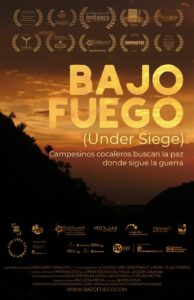
In November 2016, the Revolutionary Armed Forces of Colombia (FARC) and the office of President Juan Manuel Santos signed the Colombian peace deal.
Many hoped this would mark an end to 52 years of armed conflict. For farmers in the coca-growing region of Cauca however, this “peace” has proven to be short-lived. Bajo Fuego follows “cocaleros” as they mobilize to protect their livelihoods after the government instructs them to destroy their crops as part of the “war on drugs.” As new armed groups arise, the promised peace turns out to be an illusion for these farmers whose lives are threatened and who are displaced from their homes. Bajo Fuego exposes the lived reality behind the politics, that has left many Colombians in a continued state of war.
“What was signed were just agreements, they did not sign peace. We still have to build peace.” Farmer, Bajo Fuego
|
||||
| Beasts of No Nation | 2015 | Movie | Cary Joji Fukunaga | Link |
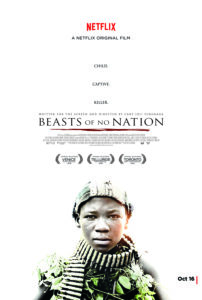
Beasts of No Nation, directed by Cary Joji Fukunaga, is a story of a young boy, Agu, taking place in an unspecified country of West Africa during civil war. Agu is enrolled by a rebel armed group and becomes a child soldier. He is then enforced to commit atrocities, and to leave his past behind, though he still hopes to find his mother back. This movie also shows the lack of protection of the civilians, forced to flee the atrocities of war, by governmental forces as well as the UN, but examines as well shortly the reintegration of demobilized children.
|
||||
| Between Frontlines - ICRC Delegates at Work | 2014 | Documentary | E. Stadelmann, J. Brandenberger, N. Castelli, G. Lamunière, Ch. Müller, L. Röösli | Link |

For the first time ever, the International Committee of the Red Cross (ICRC) has allowed an insight into its operations for one year for a television series. The series, produced by SRF, RSI and RTS together, documents the work of the ICRC's delegates in areas of conflict, crisis and war.
The International Committee of the Red Cross (ICRC) is a multi-national operation for humanity with 13,000 employees around the world. The six-part documentary series takes us from Switzerland to Colombia, the Democratic Republic of the Congo, Israel and Afghanistan.
|
||||
| Bitter Bread | 2019 | Documentary | Abbas Fahdel | Link |
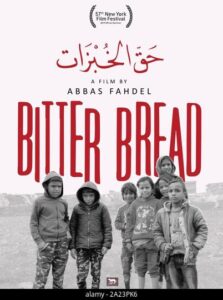
A group of refugees from Syria has temporarily settled in the Beqaa Valley in neighbouring Lebanon. Here they live and work under the supervision of a local administrator from whom they rent their land, earn their wages and to whom they are indebted. Their steel huts and tents made of plastic sheets offer little protection from the seasonal floods and the whims of an inhospitable nature. BITTER BREAD tells of the daily struggle for a decent life.
|
||||
| Children of Congo: From War to Witches | 2008 | Documentary | Dan Balluff | Link |

This film documents the suffering of thousands of street children living in Kinshasa, accused of child witchcraft, subjected to torture or child prostitution. The documentary also shows how demobilized child soldiers are reintegrated, but examines as well efforts towards the resettlement of displaced refugees and orphans in the aftermath of the eruption of the Nyiragongo volcano near Goma in Eastern Congo.
|
||||
| Children of Syria | 2016 | Documentary | Marcel Mettelsiefen | Link |
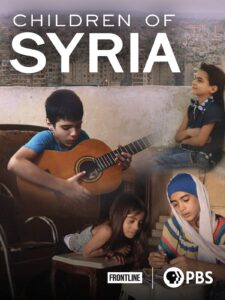
|
||||
| Congo Calling | 2020 | Documentary | Stephan Hilpert | Link |
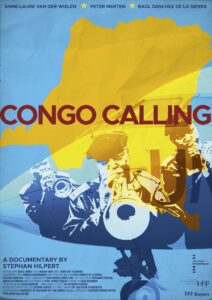
In crisis-ridden eastern Congo, three European development aid workers are forced to question what it means to help. Raúl, a French-Spanish economist doing research on rebel groups, realizes that he is leading his Congolese colleagues into great temptation with his project funds, putting their study at risk of failing. After 30 years in Africa, Peter, from Germany, reaches retirement age and is unable to renew his job contract. He struggles to stay in Congo and to preserve his identity as an aid worker. And the relationship of Anne-Laure, from Belgium, is put to the test when her Congolese boyfriend, after a stay in prison, becomes a high-profile regime critic. Deeply personal insights into coexistence and cooperation between Europe and Africa – and the question: how helpful is the help of the West?
|
||||
| Constructive Deconstruction (Series) Check if the Podcast Think Change should be added | 2017 | Podcast | Christina Bennett | Link |
|
Constructive deconstruction: future humanitarian action' is a three-part podcast series where change makers pitch radical new visions to shake up the future of humanitarian aid. In each podcast, a panel of experts explores and examines each pitch with real life stories from people on the frontline: both on the giving and receiving end of aid. We then examine what is needed to put the visions into practice to imagine an alternative future for humanitarian action. (Source: https://odi.org/en/insights/multimedia/podcast-series-constructive-deconstruction/)
|
||||
| Desert Flower | 2009 | Sherry Hormann | Link | |
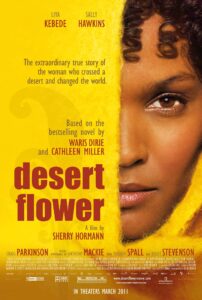
Adapted from Waris Dirie's bestselling autobiography, Desert Flower recounts the incredible story of how an African nomad overcame considerable odds and unspeakable traumas to become an international modeling sensation. The inspiring story of an extraordinary, proud and brave woman, Dirie's story is a modern fairy tale which oscillates between dazzling glamour and archaic rituals. Full of vitality, humour, emotional depth and enormous compassion, Desert Flower simultaneously offers a gripping plea to stop the terrible and inhuman tradition of female genital mutilation.
|
||||
| Dheepan | 2016 | Movie | Jacques Audiard | Link |

Winner of the Palme d’Or at the 2015 Cannes Film Festival, the new film from acclaimed director Jacques Audiard (A Prophet) is a gripping, human tale of survival. On the losing side of a civil war in Sri Lanka, a Tamil soldier (Antonythasan Jesuthasan) poses as the husband and father of two other refugees in order to escape their ravaged homeland. Arriving in France, the makeshift “family” sets about establishing a new life—only to find themselves once again embroiled in violence on the mean streets of Paris. A heartrending saga of three strangers united by circumstance and struggle, Dheepan is both a tour-de-force thriller and a powerful depiction of the immigrant experience.
|
||||
| Diaries from the Field | 2019 | Documentary | Daphne Toli and Dimitris Mavroforakis | Link |

Against the backdrop of the Rohingya humanitarian crisis in southeast Bangladesh, the documentary follows Nicholas Papachrysostomou in his role as the head of the Médecins Sans Frontières emergency response.
As recorded by him in his diaries from the field he is accustomed to keeping, he attempts to decipher the personal choices that led him to emergency humanitarian action.
|
||||
| Disaster Capitalism | 2018 | Documentary | Thor Neureiter | Link |
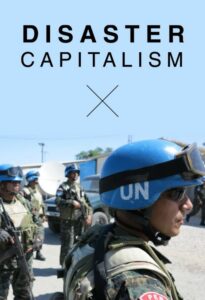
Disaster Capitalism reveals the underbelly of the global aid and investment industry. It’s a complex web of interests that spans the earth from powerful nations and multinational corporations to tribal and village leaders. This documentary offers unique insights into a multi-billion dollar world by investigating how aid dollars are spent.
Best-selling journalist and author Antony Loewenstein joins award-winning filmmaker Thor Neureiter on a six-year investigation into this world and the ramifications of disaster capitalism in Afghanistan, Haiti and Papua New Guinea. There are ideological, economic, political and corporate connections between all three states.
Told through Loewenstein's eyes and with compelling local characters, we weave them together to show viewers the dark side of Western aid. How did we get here? How can it change and who is leading it? What role and responsibility lies with Western governments? As the long-term journey unfolds, Disaster Capitalism will provide unique insight into one of the most challenging issues of our age.
|
||||
| Do Not Split | 2019 | Documentary | Anders Hammer | Link |
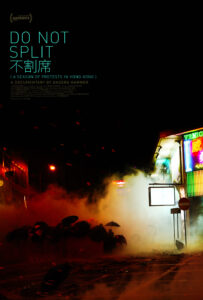
Told from within the heart of the Hong Kong protests, “Do Not Split” begins in 2019 as a proposed bill allowing the Chinese government to extradite criminal suspects to mainland China escalated protests throughout Hong Kong. Unfolding across a year, “Do Not Split” captures the determination and sacrifices of the protesters, the government’s backlash, and the passage of the new Beijing-backed national security law.
|
||||
| E-Team | 2014 | Documentary | Katy Chevigny | Link |

Anna, Ole, Fred and Peter are four members of the Emergencies Team — or E-Team — the most intrepid division of a respected, international human rights group (Human Rights Watch). Trained to deal with unfolding crises, the E-Team flies to hotspots all over the world as soon as allegations of human rights abuse surface. Then they get to work — gathering crucial evidence to determine if further investigation is warranted and, if so, to investigate, document, and capture the world's attention. They also immediately challenge the responsible decision makers, holding them accountable. Human rights abuses thrive on secrecy and silence, and the work of the E-Team, backed by their international human rights organization, has shone light in dark places and given voice to thousands whose stories would never otherwise have been told.
|
||||
| First They Killed My Father | 2017 | Movie | Angelina Jolie | Link |
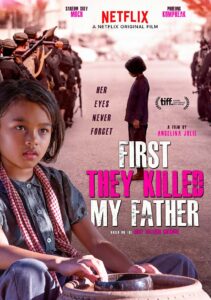
Loung Ung, an activist for human rights and a writer from Cambodia, shares her traumatic experiences as a child during the Khmer Rouge regime. In the 1970s, her family's life is drastically altered when the Khmer Rouge invades Cambodia, and they are forced to abandon their comfortable lifestyle and live in a basic work camp. After her father, who was a former officer, is killed, the family separates in order to increase their chances of survival. (Source: https://www.imdb.com/title/tt4882376/plotsummary/?ref_=tt_stry_pl)
|
||||
| Flee | 2021 | Movie | Jonas Poher Rasmussen | Link |

Recounted mostly through animation to protect his identity, Amin looks back over his past as a child refugee from Afghanistan as he grapples with a secret he’s kept hidden for 20 years.
|
||||
| For Sama | 2019 | Documentary | Waad al-Kateab and Edward Watts | Link |

FOR SAMA is both an intimate and epic journey into the female experience of war. A love letter from a young mother to her daughter, the film tells the story of Waad al-Kateab’s life through five years of the uprising in Aleppo, Syria as she falls in love, gets married and gives birth to Sama, all while cataclysmic conflict rises around her. Her camera captures incredible stories of loss, laughter and survival as Waad wrestles with an impossible choice–whether or not to flee the city to protect her daughter’s life, when leaving means abandoning the struggle for freedom for which she has already sacrificed so much. The film is the first feature documentary by Emmy award-winning filmmakers, Waad al-Kateab and Edward Watts.
|
||||
| Frost | 2017 | Movie | Šarūnas Bartas | Link |
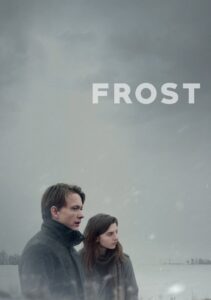
Two young Lithuanians volunteer to deliver humanitarian aid for the Ukrainian army, plunged in full separatist conflict with Russia. On their journey they discover the horrors of war and go through a crisis that will transform their lives.
|
||||
| Fuocoammare - Fire at Sea | 2016 | Documentary | Gianfranco Rosi | Link |

Fuocoammare is a documentary about Lampedusa- the tragic epicentre of the migrant experience, and the flight of migrants and refugees from Africa and the Middle East to the Sicilian island. Through the story of a twelve-year-old boy from a local fishing family and a doctor who takes care of arriving migrants, the director analyses the relationship between the refugee emergency and the daily lives of the people of Lampedusa.
|
||||
| Gaza | 2019 | Documentary | Andrew McConnell and Garry Keane | Link |

Gaza takes us to a unique place beyond the reach of television news reports to reveal a world rich with eloquent and resilient characters, offering us a cinematic and enriching portrait of a people attempting to lead meaningful lives against the rubble of perennial conflict.
|
||||
| God Grew Tired of Us: The Story of Lost Boys of Sudan | 2007 | Documentary | XX | Link |

|
||||
| HCRI Podcast | 2021? | Podcast | Link | |
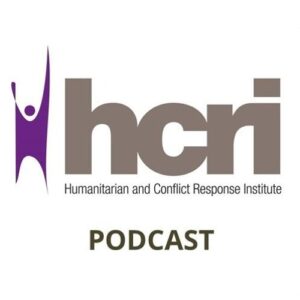
The HCRI podcast series allows us to share the fascinating and varied debates, discussions and lectures from our jam-packed event series with a global audience. Each episode can be found on the playlist below. (Source: https://www.hcri.manchester.ac.uk/connect/podcast/)
|
||||
| He Named Me Malala | 2015 | Documentary | David Guggenheim | Link |

He Named Me Malala is a personal portrait of Malala Yousafzai, a Nobel Peace Prize recipient who was attacked and severely injured by the Taliban when she was returning home on a school bus in Pakistan's Swat Valley. At the time of the attack, Malala was 15 years old and was advocating for girls' education alongside her father. The incident sparked global outrage, and she survived the attack. Today, Malala is a prominent advocate for girls' education worldwide and co-founded the Malala Fund. In this documentary, directed by acclaimed filmmaker Davis Guggenheim, we see how Malala, her father, and her family are dedicated to promoting education for all girls. The film offers a glimpse into Malala's life, including her close relationship with her father, her speeches at the UN, and her everyday life with her family. As Malala herself has said, "One child, one teacher, one book and one pen can change the world." (Source: https://www.natgeotv.com/za/shows/natgeo/he-named-me-malala)
|
||||
| Heart of the Congo | 2005 | Documentary | Tom Weidlinger | Link |

In the Heart of the Congo, at the end of five years of civil war and 300 miles from the nearest paved road, a handful of aid workers help refugees who have lost everything. Filmmaker Tom Weidlinger lives amongst them and tells their story as they train Congolese staff to run health clinics, mobilize villagers to dig wells for clean water and nurse children suffering from acute malnutrition.
War changes people’s sense of time. Survival has become a day-by-day proposition. It makes no sense to plan for tomorrow when everything can so easily be taken away. Yet thinking ahead, planting seeds for the future, is the path out of misery. Beyond ministering to immediate hunger and disease, the European and Congolese aid workers struggle to nurture villagers’ collective will and courage to build a self-sufficient future.Threats of violence from roving militia bands, systemic corruption, and the legacy of colonial dependency are daily obstacles. When Weidlinger comes down with malaria, two aid workers pick up the camera and continue to skillfully document their work. The film goes on even as the entire aid operation is threatened by a return of violence, with civilians inevitably caught in the middle. A village is burned, three health centers are pillaged, and health workers are taken hostage, but the heroes of this film, both Congolese and European, go on. Heart of the Congo is a film about courage, hope, perseverance and ways in which humanitarian aid can make a lasting difference.
|
||||
| Hidden in the Limelight of Tsunami | 2009 | Documentary | J Hyndman | Link |
| When it comes to disasters, international aid agencies and the international news media find themselves entangled in a complex relationship of mutual dependency. Due to what is sometimes called ‘the CNN effect’ and the rapid transmission of images and news across space, the media tremendously shape the global aid landscape. The film at hand explores how aid agencies adapt to particular media environments in disaster settings and, in turn, how this impacts their priorities and performance in delivering humanitarian assistance where it is needed. These issues are probed using the example of Aceh, the Indonesian province that was the highly publicized scene of the extraordinarily well-funded 2004 Indian Ocean Tsunami. In contrast, the underfunded silent disaster in Aceh resulting from protracted violent conflict between the Indonesian Government and the rebel, Free Aceh Movement, was largely invisible. Highlighting recent trends in the modem operandi of international news media and the aid industry, this case study indicates that transparency, independence and accountability are key principles that can avert the disparities between humanitarian disasters. Silent emergencies may not be tsunamis, but human life is nonetheless at risk. | ||||
| Hotel Rwanda | 2009 | Movie | Terry George | Link |

Tensions between the Hutu and Tutsi peoples lead to a civil war, in a country where corruption and bribes are routine. Paul Rusesabagina (Don Cheadle), the manager of Sabena Hôtel des Mille Collines, is Hutu but his wife, Tatiana (Sophie Okonedo), is Tutsi. His marriage is a source of friction with Hutu extremists, most prominently George Rutaganda, a friendly supplier to the hotel who also is the local leader of Interahamwe, a brutal anti-Tutsi militia.
As the political situation in the country deteriorates, Paul and his family observe neighbors being dragged from their homes and openly beaten in the streets. Paul curries favor with people of influence, bribing them with money and alcohol, seeking to maintain sufficient influence to keep his family safe. When civil war erupts and a Rwandan Army officer threatens Paul and his neighbors, Paul barely negotiates their safety, and brings everyone to the hotel. More refugees come to the hotel from the overburdened United Nations camp, the Red Cross, and orphanages. Paul must divert the Hutu soldiers, care for the refugees, be a source of strength to his family, and maintain the appearance of a functioning high-class hotel, as the situation becomes more and more violent, with mobs in the streets just outside the gates.
The UN Peacekeeping forces, led by Colonel Oliver (Nick Nolte), are unable to take assertive action against the Interhamwe since they are forbidden to intervene in the genocide. The foreign nationals are evacuated, but the Rwandans are left behind. When the UN forces attempt to evacuate a group of refugees, including Paul's family, they are ambushed and must turn back. In a last-ditch effort to save the refugees, Paul speaks to the Rwandan Army General, Augustin Bizimungu (Fana Mokoena) and when the bribes no longer work, he blackmails him with threats of being tried as a war criminal. The family and the hotel refugees finally leave the besieged hotel in a UN convoy, and they travel through retreating masses of refugees and militia to reach safety behind Tutsi rebel lines (source IMDB).
|
||||
| Human Flow | 2017 | Documentary | Ai Wei Wei | Link |

Over 65 million people around the world have been forced from their homes to escape famine, climate change and war in the greatest human displacement since World War II. Human Flow, an epic film journey led by the internationally renowned artist Ai Weiwei, gives a powerful visual expression to this massive human migration. The documentary elucidates both the staggering scale of the refugee crisis and its profoundly personal human impact.
Captured over the course of an eventful year in 23 countries, the film follows a chain of urgent human stories that stretches across the globe in countries including Afghanistan, Bangladesh, France, Greece, Germany, Iraq, Israel, Italy, Kenya, Mexico, and Turkey. Human Flow is a witness to its subjects and their desperate search for safety, shelter and justice: from teeming refugee camps to perilous ocean crossings to barbed-wire borders; from dislocation and disillusionment to courage, endurance and adaptation; from the haunting lure of lives left behind to the unknown potential of the future. Human Flow comes at a crucial time when tolerance, compassion and trust are needed more than ever. This visceral work of cinema is a testament to the unassailable human spirit and poses one of the questions that will define this century: Will our global society emerge from fear, isolation, and self-interest and choose a path of openness, freedom, and respect for humanity?
|
||||
| Humanitarian Diplomacy | 2021 | Podcast | Antonio De Lauri, Salla Turunen | Link |

In this podcast series dedicated to humanitarianism and humanitarian diplomacy, Chr.Michelsen Institute (CMI) Doctoral Researcher Salla Turunen and Research Professor Antonio De Lauri invite experts from various fields to discuss the concept. The first episode, hosted by Turunen, features a conversation with philosopher and Senior Researcher Kristoffer Lidén from the Peace Research Institute Oslo, where they explore the topic of humanitarian ethics. The episode delves into questions such as the feasibility of implementing humanitarian principles in a less-than-ideal world, the challenges of balancing humanitarian ideals with operational realities on the ground, and the ethical issues raised by humanitarian diplomacy. To learn more, tune in to the Humanitarian Diplomacy podcast, available on Spotify and Anchor. The podcast is part of the CMI research project "Humanitarian Diplomacy: Assessing Policies, Practices and Impact of New Forms of Humanitarian Action and Foreign Policy," which is funded by the Research Council of Norway. (Source: https://www.humanitarianstudies.no/resource/humanitarian-diplomacy-podcast/)
|
||||
| Humanitarian Leadership Academy | 2023 | Podcast | Humanitarian Leadership Academy | Link |
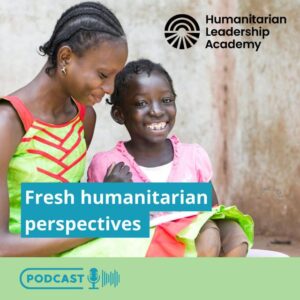
Fresh humanitarian perspectives and reflections from the Humanitarian Leadership Academy and their network.
|
||||
| Hunger Ward | 2020 | Documentary | Skye Fitzgerald | Link |

In March 2018, the UN reported that 10 million Yemenis were one step away from famine and that hunger is threatening an entire generation. Borne out of a sense of urgency at the sustained civilian suffering caused by the human-caused famine in Yemen, we embedded with a team of doctors and nurses working at Therapeutic Feeding Centers (TFCs) treating those most at risk of starvation.
Filmed from inside two of the most active therapeutic feeding centers in Yemen, HUNGER WARD documents two women health care workers fighting to thwart the spread of starvation against the backdrop of a forgotten war. The film provides an unflinching portrait of Dr. Aida Alsadeeq and Nurse Mekkia Mahdi as they try to save the lives of hunger-stricken children within a population on the brink of famine.
|
||||
| I was held hostage for 317 days. Here's what I thought about… | 2015 | Documentary | Vincent Cochetel | Link |
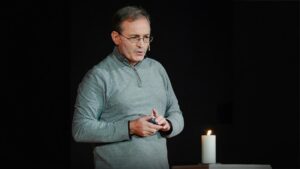
Vincent Cochetel was held hostage for 317 days in 1998, while working for the UN High Commissioner on Refugees in Chechnya. For the first time, he recounts the experience — from what it was like to live in a dark, underground chamber, chained to his bed, to the unexpected conversations he had with his captors. With lyricism and power, he explains why he continues his work today. Since 2000, attacks on humanitarian aid workers have tripled — and he wonders what that rise may signal to the world.
|
||||
| In Pursuit of Development | 2023 | Podcast | Dan Banik | Link |
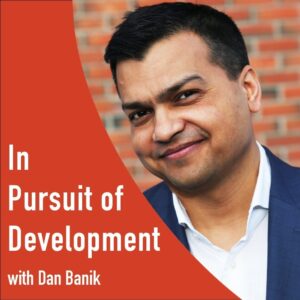
If you are interested in democracy, poverty eradication and climate change, this is your go-to podcast for a deeper understanding of the politics of global development. In each episode, we discuss the experiences of developing and “emerging economies” in Africa, Asia and Latin America. While we examine major global challenges and highlight various “problems”, we also highlight promising practices and what works on the ground. This podcast is hosted by Professor Dan Banik from the University of Oslo's Centre for Development and the Environment (Twitter: @danbanik @GlobalDevPod).
|
||||
| In this World | 2003 | Movie | Michael Winterbottom | Link |
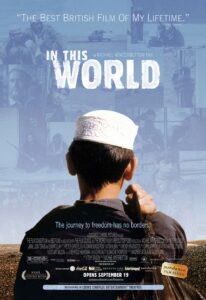
In February 2002, at the Shamshatoo Refugee Camp in Pakistan's North West Frontier Province, 53,000 refugees had been living in sub-human conditions since the Soviet Union's invasion in 1979 and the USA's bombing and invasion of Afghanistan in 2001. Enayat's Afghan family and his cousin Jamal decide to send them illegally to London to have a better life. To achieve this, they hire coyotes to smuggle the cousins through Iran and Turkey to Italy, and finally to London, hidden inside trucks and containers. However, the long journey, locked in a container with other families, poses a significant challenge to the boys (source IMDB).
|
||||
| Intercross: The Podcast | Podcast | ICRC | Link | |
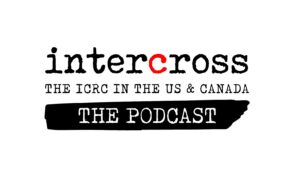
Brought to you by the International Committee of the Red Cross’ delegation for the US & Canada, this is a hub for conversations about all things humanitarian. (Source: https://intercrossblog.icrc.org/)
|
||||
| Jim: The story of James Foley | 2016 | Documentary | Brian Oakes | Link |

Director Brian Oakes explores the life and death of his childhood friend, Frontline journalist James Foley.
|
||||
| Kinshasa Symphony | 2010 | Documentary | Claus Wischmann and Martin Baer | Link |
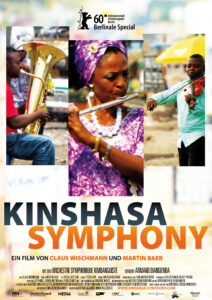
The Film "Kinshasa Symphony" shows how people living in one of the most chaotic cities in the world have managed to forge one of the most complex systems of human cooperation ever invented: a symphony orchestra. It is a film about the Congo, about the people of Kinshasa and about music.
|
||||
| L’humanitaire pris aux mots (Taking the humanitarian sector at its word(s)) | Podcast | Groupe URD | Link | |

“L’humanitaire pris aux mots” (“Taking the humanitarian sector at its word(s)”) is the Groupe URD podcast (in French). Each short episode looks at the aid sector via key words. Each word is viewed from several angles and, for each episode, a specialist shares their point of view.
|
||||
| Learning to Skateboard in a War Zone (If You´re a Girl) | 2019 | Documentary | Carol Dysinger | Link |
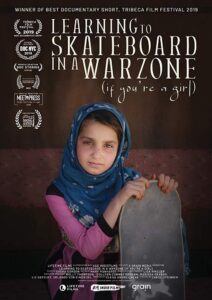
Unimaginable: girls learn to skateboard in Kabul. This is not only a challenge for them, but even more so for society. With every practice session in the gym, the girls pick up speed: Their body awareness grows, their self-confidence rises. Suddenly, going to university is no longer a far-fetched idea for two sisters. Hamburg-based director Zamarin Wahdat was honoured with an Oscar this year for this upbeat film that shows a different Afghanistan.
|
||||
| Lika a Pebble in the Boot | 2017 | Documentary | Hélène Choquette | Link |

Hélène Choquette's latest documentary research led her to this compelling story of Senegalese street vendors in Florence, who have migrated to Europe for economic reasons, hoping for a better future for their families. She will cast an empathetic gaze on people whose voices would otherwise remain silent. song.
|
||||
| Limbo | 2020 | Movie | Ben Sharrock | Link |
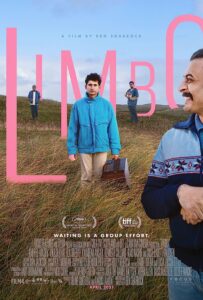
An offbeat observation of refugees waiting to be granted asylum on a fictional remote Scottish island. It focuses on Omar, a young Syrian musician who is burdened by the weight of his grandfather’s oud, which he has carried all the way from his homeland.
|
||||
| Living in Emergency | 2011 | Documentary | Mark N. Hopkins | Link |
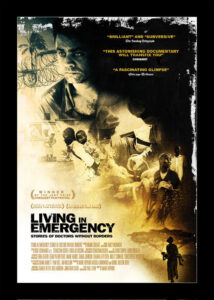
For the first time ever, MSF gave a documentary crew uncensored access to its field operations. Set in war-torn Congo and post-conflict Liberia, “Living in Emergency” interweaves the stories of four doctors as they struggle to provide emergency medical care under extreme conditions. Two volunteers are new recruits: a 26-year-old Australian doctor stranded in a remote bush clinic and an American surgeon from Tennessee trying to cope under the load of emergency cases in a shattered capital city.
Two others are experienced field hands: a dynamic head of mission, valiantly trying to keep morale high and tensions under control, and an exhausted veteran, who has seen too much horror and wants out. Amid the chaos, each doctor must find their own way to face the challenges of the work, the tough choices, and the limits of their idealism.
|
||||
| Malteser International in Africa - With the people, for the people | 2007 | Documentary | Malteser International | Link |
| Malteser International is the Order of Malta's worldwide relief agency. It provides humanitarian aid in all parts of the world without distinction of religion, race or political persuasion. For more, visit our website! Global website: www.malteser-international.org US website: orderofmaltarelief.org | ||||
| Most Shocking Second a Day Video | 2015 | Martin Stirling | Link | |
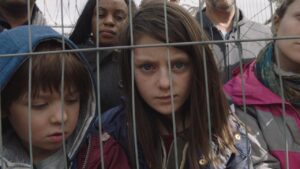
It's an advertisement made by Save the Children for fundraising. The technique of using a European setting to relate to a refugee crisis produced a significant number of shares online (it's not much of a movie but could be used to show new marketing/fundraising techniques).
|
||||
| Nasrin | 2020 | Documentary | Jeff Kaufman and Marcia S. Ross | Link |
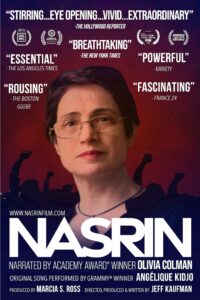
Filmed in Iran by women and men who risked arrest to make this film. NASRIN is an immersive portrait of one of the world’s most courageous human rights activists and political prisoners, Nasrin Sotoudeh, and of Iran’s remarkably resilient women’s rights movement. Featuring acclaimed filmmaker Jafar Panahi, Nobel Peace Prize laureate Shirin Ebadi, journalist Ann Curry, exiled women’s rights activist Mansoureh Shojaee, and Nasrin’s equally courageous husband Reza Khandan. In the courts and on the streets, Nasrin has long fought for the rights of women, children, LGBT prisoners, religious minorities, journalists and artists, and those facing the death penalty. She was arrested in June 2018 for representing women who were protesting Iran’s mandatory hijab law, and she was sentenced to 38 years in prison, plus 148 lashes. Even from prison, she has continued to challenge the authorities. An Amnesty International petition calling for her release received over a million signatures from 200 countries.
|
||||
| Orange Revolution | 2007 | Documentary | Steve York | Link |
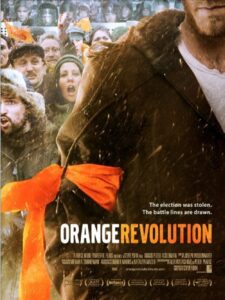
Orange Revolution chronicles Ukraine's 2004 presidential campaign, from one candidate's poisoning to the intimidation of voters, acid-bombing of ballot boxes, and the political pressure put on election officials to count votes a certain way. The government's contempt for the people's choice brings nearly a million citizens into the streets of Kyiv for a 17-day around-the-clock protest. With music, interviews, and rare footage of the demonstrations, this film captures the spirit and determination of the most successful political protest of the decade, and raises a timely question: Just how far would you go to protect your vote?
|
||||
| Persepolis | 2007 | Movie | Vincent Paronnaud, Marjane Satrapi | Link |
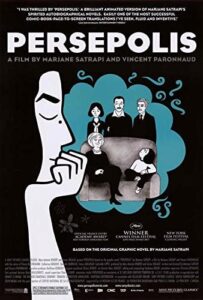
Teheran, 1978. An eight-years-old girl, Marjane, dreams of her future, while she carefully pays attention to the coming revolution that will lead to the fall of the Sha's. Brought up in a modern and educated family, Marjane doesn't shy away from rebelling against constraints (veil, behaviour...) imposed by the new Islamic Republic. As the war against Iraq breaks out, Marjane becomes confronted to daily bombings and the loss of relatives. Her parents then decide to send her to Austria, where she will experience loneliness, exile and the difference.
|
||||
| Photographer of War | 2019 | Documentary | Boris B. Bertram | Link |
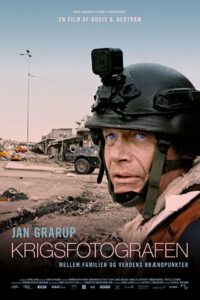
Jan Grarup is a world famous war photographer (multiple World Press Photo award winner) who becomes torn between his career and his family life. When his ex-wife falls seriously ill Jan Grarup suddenly has to take care of his three children by himself.
For more than 25 years he has taken photographs in war and conflict zones like Rwanda, Balkan, Darfur, Iraq and The Central African Republic putting his own life on the line. Now as the main caretaker of the children his life and his photography is facing a new reality.
|
||||
| Poverty INC | 2011 | Documentary | Michael Matheson Miller and Mark Weber | Link |

FIGHTING POVERTY IS BIG BUSINESS. BUT WHO PROFITS THE MOST?
Website: PovertyINC.org Twitter: #PovertyINC
“I see multiple colonial governors,” says Ghanaian software entrepreneur Herman Chinery-Hesse of the international development establishment in Africa. “We are held captive by the donor community.”
The West has positioned itself as the protagonist of development, giving rise to a vast multi-billion dollar poverty industry — the business of doing good has never been better.
Yet the results have been mixed, in some cases even catastrophic, and leaders in the developing world are growing increasingly vocal in calling for change.
From TOMs Shoes to international adoptions, from solar panels to U.S. agricultural subsidies, the film challenges each of us to ask the tough question: Could I be part of the problem?
Drawing from over 200 interviews filmed in 20 countries, Poverty, Inc. unearths an uncomfortable side of charity we can no longer ignore.
|
||||
| Quo vadis, Aida? | 2020 | Movie | Jasmila Žbanić | Link |

Bosnia, July 1995. Aida (Jasna Ðuriči) is a translator for the UN in the small town of Srebrenica. When the Serbian army captures the town, her family is among the thousands of people seeking shelter in the UN camp. As an interpreter in the negotiations, Aida has access to crucial information. She tries to distinguish between lies and truths in order to find out how she could save her family and her fellow citizens.
|
||||
| Radio Silence | 2020 | Documentary | Juliana Fanjul | Link |
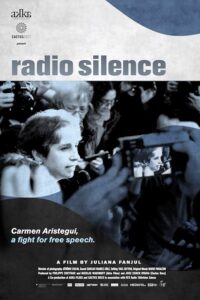
Mexico, March 2015. Carmen Aristegui, incorruptible journalist, is fired from the radio station where she has worked for years. But Carmen continues her fight: raising awareness and fighting against misinformation. The film tells the story of this quest: difficult and dangerous, but essential to the health of democracy. A story in which resistance becomes a form of survival.
|
||||
| Refugee | 2018 | Documentary | Alexander J. Farrell | Link |
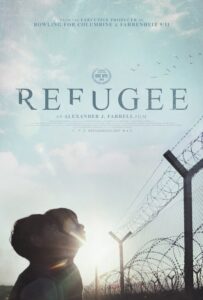
In 2015, at the height of the Syrian war, Raf’aa a Syrian mother was forced to make the ultimate sacrifice. With her husband Nazem in hospital, and the bombs getting closer to Qamilshi, she fled Syria to find asylum for her family. Leaving Nazem, and their two children Ahmed and Hamoudi behind.
They had hoped to reunite in Europe within a few weeks, at least that was the plan. But by the time Nazem and the children left…it was too late. The political climate had changed and the borders to Europe were closed.
Now safe in Germany, Raf’aa is traumatized by what she witnessed on her journey, and prays her children have not endured the same. Whilst two thousand miles away, Nazem and her children live through their own nightmare in one of the worst refugee camps in Europe.
Over the next eighteen months, we witness the testament of the human spirit as the family fights to be reunited. And a father shields his children from what it means to be a Refugee.
|
||||
| Restrepo | 2010 | Documentary | Sebastian Junger & Tim Hetherington | Link |

RESTREPO is a feature-length documentary that chronicles the deployment of a platoon of U.S. soldiers in Afghanistan's Korengal Valley. The movie focuses on a remote 15-man outpost, "Restrepo," named after a platoon medic who was killed in action. It was considered one of the most dangerous postings in the U.S. military. This is an entirely experiential film: the cameras never leave the valley; there are no interviews with generals or diplomats. The only goal is to make viewers feel as if they have just been through a 90-minute deployment. This is war, full stop. The conclusions are up to you.
|
||||
| Rethinking Humanitarian Action | ??? | Podcast | Heba Aly | Link |

The podcast "Rethinking Humanitarianism," which is hosted by TNH CEO Heba Aly, discusses the outlook for aid in various aspects, such as the involvement of private companies in humanitarian response, how the aid industry can improve its readiness for climate change, and more. (Source: https://www.thenewhumanitarian.org/podcast)
|
||||
| Salam Neighbor | 2015 | Documentary | Zach Ingrasci, Chris Temple | Link |
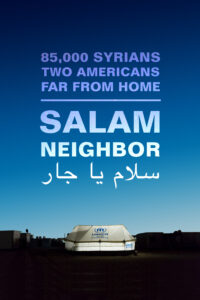
Salam Neighbor is an award-winning feature documentary and campaign to connect the world to refugees. Our goal is to tell the stories of our refugee neighbors with the dignity they deserve and the depth the world needs. We hope you’ll join this effort by watching the film, sharing these stories and getting involved.
|
||||
| Seeking Refuge | 2012 | Movie | BBC | Link |
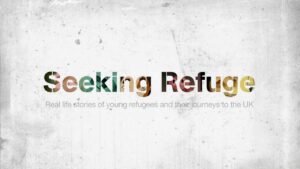
Seeking Refuge is multi-awarded, BAFTA-winning series of animated documentaries for BBC exploring the experiences young refugees and asylum seekers who are living in the UK. Using the testimonies of five young people we worked with animators to tell their story visually. The films formed a key part of Refugee Week in June 2012.
|
||||
| Seeking Refuge | 2019 | Podcast | University of South Carolina | Link |

Want to hear some extraordinary stories of resilience and humanity? Tune in to Seeking Refuge for the human stories of refugees and those working to protect them. Our guests talk everything from going to the International Court of Justice to making cross-genre music, from incredible acts of resilience to the everyday things that make them smile. We also talk issues facing refugees such as education, health care, and legal rights, and we learn about the history of refugees and the current world events impacting them. Seeking Refuge was started by a group of students at the University of South Carolina who want to depoliticize the narrative around the refugee crisis. We focus on bringing you stories from refugees themselves and those on the frontlines of the crisis, giving a platform to the human beings who know the most about the refugee experience.
|
||||
| Selfish – The Humanitarian in the Field of the Intimate | 2020 | Documentary | Stéphane Santini and Géraldine André | Link |

War, emergency, pandemics and hunger. Humanitarian workers are used to working in the most varied and extreme missions and contexts across the planet. However, few of them venture openly into the world of personal feelings. For this film, forty humanitarian workers and their loved ones did just that, speaking without reserve about the risk, the commitment, the first mission, the sense of powerlessness, the encounters, the passion, the return home and the unspeakable things they’ve witnessed.
|
||||
| Selma | 2014 | Ava DuVernay | Link | |
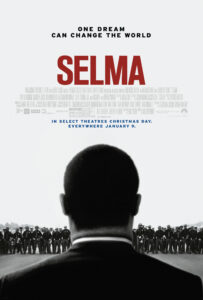
A chronicle of Martin Luther King's campaign to secure equal voting rights via an epic march from Selma to Montgomery, Alabama in 1965.
|
||||
| Shadow Game | 2021 | Documentary | Eefje Blankevoort and Els van Driel | Link |

Shadow Game is an experimentally filmed account of the far-reaching consequences of European asylum policy. Now that fences have gone up all over Europe, seeking asylum has become almost impossible. The teenagers cross snowy landscapes and meet aggressive border police on their way. Reaching their final destination has become more difficult than ever. Their journey takes them through the whole of Europe: from Greece to North Macedonia, Serbia and Bosnia and Herzegovina, from Italy to France and The Netherlands. The film was shot over a period of three years, partly by the main characters themselves on their phones.
|
||||
| Silvered Water, Syria Self-Portrait | 2014 | Documentary | Ossama Mohammed, Wiam Simav Bedirxan | Link |

In 2011, Ossama Mohammed fled Syria. Experiencing estrangement in Paris while haunted by images of violence taken during the revolution by Syrian activists and soldiers, Ossama encountered Wiam, a Kurdish woman living in Homs. By chatting, they started cooperating and producing the film, which witnesses the horrors of the Syrian civil war, and the hard living conditions under besieged Homs. This movie, though not linked to humanitarian action, shows and makes us experience the trauma Syrians go through, and the estrangement people fleeing conflicts can experience.
|
||||
| Simple as Water | 2021 | Documentary | Megan Mylan | Link |

Simple As Water is a love story celebrating the bonds of family. Oscar®-winning director Megan Mylan documents Syrian families filmed over five years in five countries to reveal the impact of war, separation, and displacement.
The film follows: Yasmin, a mother of four living in a tent in the port of Athens; Samra, a widow on the Turkey-Syria border grappling with the decision to leave her children in an orphanage in hopes of giving them a better chance in life; 22-year-old Omar, who's taken on the role of parent to his younger brother in Pennsylvania; Diaa, who's remained in Syria while tirelessly searching for her "disappeared" son; and Safwan, who lives in temporary housing in Germany andlaments lost milestones with his children.
Epic in scope but intimate in feel, Simple As Water underscores the universal importance of family.
|
||||
| Sri Lanka's Killing Fields | 2011 | Documentary | Callum Macrae | Link |
| Sri Lanka's Killing Fields was an investigatory documentary about the final weeks of the Sri Lankan Civil War broadcast by the British TV station Channel 4 on 14 June 2011. Described as one of the most graphic documentaries in British TV history, the documentary featured amateur video from the conflict zone filmed by civilians and Sri Lankan soldiers which depicted "horrific war crimes". The video filmed by civilians included harrowing scenes during and after intense shelling of civilian targets, including hospitals, by the Sri Lankan military. The "trophy video" filmed by Sri Lankan soldiers showed disturbing scenes of blindfolded victims being executed and dead bodies of naked women being dragged onto trucks by soldiers as they made lewd remarks about the victims. The documentary also included interviews with civilians who managed to survive the conflict, United Nations staff based in Sri Lanka during the conflict, human rights organisations and an international law expert. The documentary was made by ITN Productions and presented by Jon Snow, the main anchor on Channel 4 News. | ||||
| Stories and Humanitarian Action | ??? | Podcast | Ruth Mukwana | Link |
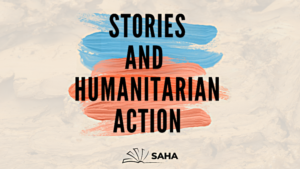
In 2022, 274 million people will need humanitarian assistance and protection. preventing, mitigating and responding to humanitarian crises is a challenge. can fiction and storytelling play a role? can it raise awareness and motivate action to address the causes and consequences of humanitarian crises? Saha podcast discusses this question. (Source:
|
||||
| Taking Root | 2008 | Documentary | Alan Dater, Lisa Merton | Link |

Taking Root tells the dramatic story of Kenyan Nobel Peace Prize Laureate Wangari Maathai whose simple act of planting trees grew into a nationwide movement to safeguard the environment, protect human rights, and defend democracy—a movement for which this charismatic woman became an iconic inspiration.
Taking Root is the most comprehensive, in-depth film about Wangari Maathai available. It was made in close collaboration with her during the last decade of her life.
|
||||
| Talking Humanitarianism | 2021 | Podcast | Norweigan Centre for Humanitarian Studies | Link |

In this podcast, you will hear from researchers and practitioners who share their findings and reflections on a range of humanitarian issues from migration, conflict and disaster to health and governance.
Access Talking Humanitarianism where you get most of your podcasts, including Spotify and Apple or listen via our website below.
The Talking Humanitarianism podcast series is an initiative of the Research Network on Humanitarian Efforts of the NCHS.
|
||||
| The Ambassador | 2011 | Documentary | Mads Brügger | Link |
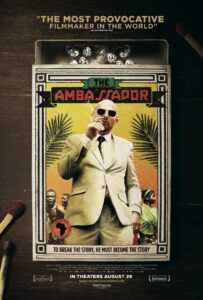
Danish journalist Mads Brügger goes undercover as a Liberian Ambassador to embark on a dangerous yet hysterical journey to uncover the blood diamond trade in Africa.
|
||||
| The Daughters of Destiny | 2017 | Documentary | Vanessa Roth | Link |

Since 1997, the Shanti Bhavan school has provided free education for some of India's most impoverished and underrepresented children – the "poorest of the poor." In Daughters of Destiny: The Journey of Shanti Bhavan, director Vanessa Roth tells viewers the unforgettable story of a school that has changed countless lives for the better. With any luck, it might even inspire others to do the same. Now streaming on Netflix.
|
||||
| The Foreign Aid Paradox | 2014 | Documentary | Heidi Ewing and Rachel Grady | Link |

Why does the U.S. fund foreign aid?
The U.S. spends approximately $37 billion dollars a year on foreign aid - just under 1% of our federal budget. THE FOREIGN AID PARADOX zeroes in on food aid to Haiti and how it affects American farming and shipping interests as well as Haiti's own agricultural markets. The result: a surprising study in unintended consequences.
|
||||
| The Good Humanitarian | 2025 | Podcast | The Hague Humanitarian Studies Centre | Link |

Have you ever sat and wondered how disasters like floods and earthquakes intersect with conflicts, or how climate change will influence the disasters and responses of tomorrow? Humanitarianism is often thought to be about heroes and victims. But really, it’s about people, just like you and I, living through and dealing with extreme situations in their own ways. The humanitarian system is itself a patchwork of people and organisations. And, like all systems, the people who work within it can make mistakes or bad decisions. The first season of ‘The Good Humanitarian’ podcast delves into all of this and more with experts from the HSC.
|
||||
| The Good Lie | 2014 | Movie | Philippe Falardeau | Link |

A group of Sudanese refugees given the chance to resettle in America arrive in Kansas City, Missouri, where their encounter with an employment agency counselor forever changes all of their lives (source: IMDB).
|
||||
| The Greatest Silence | 2008 | Documentary | Lisa F. Jackson | Link |

Shot in the war zones of the Democratic Republic of Congo (DRC), this documentary feature explores the shocking plight of women and girls caught in the sexual crossfire as this giant African nation enters its second decade of internal conflict. Since 1998, a brutal war has ravaged the DRC, killing over 4 million people. Over the same time, tens of thousands of women and girls have been systematically kidnapped, raped, mutilated and tortured by soldiers - both from foreign militias and the Congolese army that is supposed to protect them. Emmy®-winning filmmaker Lisa F. Jackson, herself a survivor of gang rape, travels deep inside the DRC to understand what is happening and why. Her resultant film features interviews with survivors, activists, peacekeepers, physicians and, most chillingly, two groups of rapists who are soldiers of the Congolese Army. Above all, it highlights first-person accounts of dozens of rape survivors, who recount their stories with pulverizing honesty and immediacy. Heart-wrenching in its portrayal of the grotesque realities of life in Congo, the film also provides inspiring examples of resiliency, courage and grace, while serving as a call to action for anyone with a conscience.
|
||||
| The Kite Runner | 2007 | Movie | Marc Forster | Link |

After spending years in California, Amir returns to his homeland in Afghanistan to help his old friend Hassan, whose son is in trouble.
|
||||
| The Land between | 2013 | Documentary | David Fedele | Link |
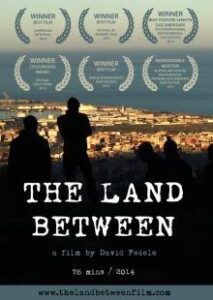
THE LAND BETWEEN offers an intimate insight into the hidden and desperate lives of Sub-Saharan African migrants living in the mountains of northern Morocco. For most, their dream is to enter Europe by jumping a highly-militarised barrier into Melilla, a Spanish enclave on the African continent.
With unique and unprecedented access, this film documents the everyday life of these migrants trapped in limbo, as well as the extreme violence and constant mistreatment they face from both the Moroccan and Spanish authorities. It also explores many universal questions, including how and why people are prepared to risk everything, including their life, to leave their country, their family and friends, in search of a new and better life.
|
||||
| The Land of the Enlightened | 2016 | Documentary | Pieter-Jan De Pue | Link |
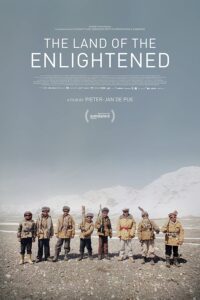
A gang of Afghan children from the nomad Kuchi tribe dig out soviet mines and sell the explosives to children working in lapis lazuli mines. Meanwhile, another gang of children waylay caravans smuggling blue gemstones through the mountains of Pamir. De Pue's hybrid fictional-documentary film makes us experience a journey into a beautiful war-torn Afghanistan, where old myths and fables shed light on the paradoxical beauty and roughness of survival. By giving the voice to children, De Pue offers a look at the uncertain future of Afghanistan for the next generation, but most importantly witnesses the resilience of the Afghan people, and finally raises questions on the presence of American troops, hidden in mountains, and how they interact with the locals.
|
||||
| The Last Face | 2016 | Movie | Sean Penn | Link |
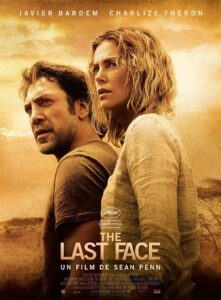
The movie was screened at WHS 2016 in Istanbul. The plot is about a director of an international aid agency in Africa meeting a relief aid doctor amidst a political/social revolution. Together they face tough choices surrounding humanitarianism and life through civil unrest.
|
||||
| The Most Distant Places | 2010 | Documentary | Mike Seely | Link |
| Dr. Edgar Rodas has dedicated his life to improving the health conditions for underprivileged communities in his native Ecuador, and Cinterandes is his visionary mobile hospital and rural health care project. The Most DistantPlaces follows Dr. Rodas and his team to the far reaches of Ecuador, interweaving intimate portrayals of the doctors with stories of the patients they treat. Traveling from indigenous areas in the Andes to fishing villages on the coast to Amazonian river communities, this film is a unique and hopeful look at the challenges of providing health care for impoverished people located far from adequate medical facilities. | ||||
| The Normal Heart | 2014 | Documentary | Ryan Murphy | Link |
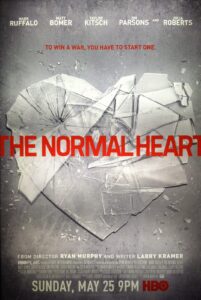
The story of the onset of the HIV-AIDS crisis in New York City in the early 1980s, taking an unflinching look at the nation's sexual politics as gay activists and their allies in the medical community fight to expose the truth about the burgeoning epidemic to a city and nation in denial.
|
||||
| The Price of Cheap | 2020 | Documentary | Barry Stevens | Link |

The Price of Cheap tells the stories of modern slaves in textiles manufacturing supply chains and the brave individuals fighting on the ground against immeasurable odds to help them. We follow a man named Joseph Raj, who runs an organization called T.E.S.T. (Trust for Education and Social Transformation) in Tamil Nadu, India as he goes on raids to rescue underage children from unsafe and labour intensive factories. We hear from the survivors he has helped rescue, hear of their horrific experiences, and desire for education and change. Academics and social justice workers weigh in on why the issue of forced labour persists.
|
||||
| The Promised Land | 2019 | Documentary | Eric Tlozek | Link |

Over 18-months, this revealing investigation tracks the journey of two asylum seekers who were granted freedom from Manus Island following a historic refugee deal with the United States – following them from behind the wire to their new lives in North America in the most intimate and detailed account so far of life for Manus refugees.
|
||||
| The Right Girls | 2020 | Documentary | Timothy Wolfer | Link |

On a quest to find acceptance and happiness, three young, transgender women - Valentyna, Joanne, and Chantal - meet at the southern tip of Mexico and decide to join the migrant caravan and embark on a 2400-mile journey to the US border together. Fleeing extortion, discrimination, and abusive relationships in their home countries, the women endure hardship after hardship as they slowly make their way to the US – never losing sight of their dream of acceptance and opportunity.
|
||||
| The Samaritans | 2013 | Hus Kurji | Link | |

The Samaritans is a comedy about an NGO that does nothing. The Samaritans is a snarky, scripted series centered around the absurdities of Aid for Aid™, a dysfunctional, fictitious non governmental organization (NGO). In the Kenya field office, the cosmopolitan staff deal with the strange demands and decisions of UK headquarters and hopelessly inept local bureaucracies, all under the guise of ‘Saving Africa’. Season One follows the team as they apply for the largest grant in the organization’s history.
|
||||
| The Shock Doctrine | 2009 | Documentary | Mat Whitecross, Michael Winterbottom | Link |
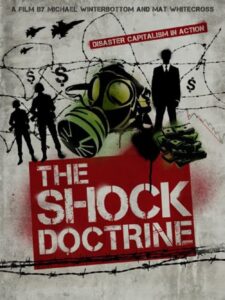
An investigation of "disaster capitalism", based on Naomi Klein's proposition that neo-liberal capitalism feeds on natural disasters, war and terror to establish its dominance.
|
||||
| The Stoning of Soraya M. | 2008 | Cyrus Nowrasteh | Link | |
| This is gender based violence (GBV) movie. Stranded in the remote Iranian village of Kuhpayeh by car trouble, a journalist is approached by Zahra, a woman with a harrowing tale to tell about her niece, Soraya, and the bloody circumstances of Soraya's death, by stoning, the previous day. | ||||
| The Swimmers | 2022 | Movie | Sally El Hosaini | Link |
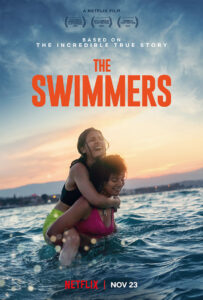
Two Syrian sisters flee their war-torn home in Damascus, swim for hours in choppy Mediterranean seas to reach Greece as asylum seekers before going on to compete at the Rio Olympic Games.
|
||||
| The Trouble With Aid | 2012 | Documentary | Ricardo Pollack | Link |
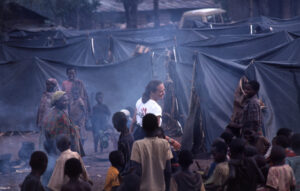
From the Biafran conflict, the crisis in Cambodia, through the Ethiopian famine, the genocide in Rwanda, to the military intervention in Somalia, Kosovo, and Afghanistan, Ricardo Pollack raises the question whether humanitarianism can sometimes do more good than harm. The documentary shows through several testimonies of key humanitarian players and scholars, such as Hugo Slim, Antonio Donini, the unintended consequences of aid.
|
||||
| The Whistleblower | 2011 | Movie | Larysa Kondracki | Link |

In 1999, the UN contracted former policewoman Kathryn Bolkovac as a human rights abuse investigator in Bosnia. Upon her arrival, she realized that many of the UN peacekeepers were participating in the sex trafficking of girls and women. When she tried to take action, her complaints were covered up and she was fired. In 2002, she sued. Rachel Weisz stars as Bolkovac with Vanessa Redgrave, Monica Bellucci, and David Strathairn in supporting roles. Ban Ki-moon (then the UN General Secretary) screened The Whistleblower for UN officials. The movie received some criticism for its portrayal of violence.
|
||||
| The White Helmets | 2016 | Documentary | Orlando von Einsiedel | Link |

In Aleppo, the most important thing to remember is that all life is precious. The White Helmets search for survivors among the wreckage as bombs continue to fall. These ordinary men are extraordinary heroes. Now Streaming on Netflix.
|
||||
| They Shall Not Perish: The Story of Near East Relief | 2016 | Documentary | George Billard | Link |

The story of the men and women who worked to save the Armenian people and other Christian minorities in the wake of the genocide perpetrated by the Ottoman government in Turkey.
It is told through the individual stories of those who bore witness, rallied the country, raised money, and delivered aid and comfort. Utilizing leading academic experts and voice-over narration against a mix of historical film, photographs and contemporary footage, TSNP takes viewers on a journey from the depths of cruelty to the triumphs of survival.
|
||||
| This is Congo | 2017 | Documentary | Daniel McCabe | Link |

The Democratic Republic of the Congo has seen more than five million conflict-related deaths, multiple regime changes and the wholesale impoverishment of its people in the past two decades. This is Congo immerses the viewer onto the frontlines of battle with key players including a whistleblower and military commanders to provide a truly unfiltered and unique look into the conflict plaguing Congo.
|
||||
| Three Songs for Benazir | 2021 | Documentary | Elizabeth and Gulistan Mirzaei | Link |
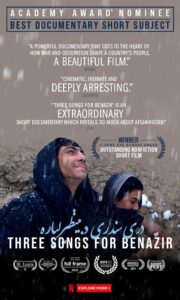
The story of Shaista, a young man who—newly married to Benazir and living in a camp for displaced persons in Kabul—struggles to balance his dreams of being the first from his tribe to join the Afghan National Army with the responsibilities of starting a family. Even as Shaista’s love for Benazir is palpable, the choices he must make to build a life with her have profound consequences.
Winner of 13 awards, including the Cinema Eye Honors Outstanding Nonfiction Short and the Audience Award at Clermont-Ferrand International Short Film Festival.
|
||||
| Timbuktu | 2014 | Movie | Abderrahmane Sissako | Link |

Abderrahmane Sissako, who was born in Mali, has based his new film on a news story from the country in which a couple was stoned to death for having children outside of marriage. Sissako has taken various elements of the incident and turned them into separate fictional scenes to create a more nuanced and complex portrayal of the event. Rather than simply evoking outrage and horror, he attempts to understand the mindset of the aggressors. The film is a powerful critique of bigotry, arrogance, and violence, and it resonates particularly strongly in light of the aggressive and destructive actions of groups like ISIS. Sissako's film is a moving and profound condemnation of these harmful attitudes and behaviors, expressed with a remarkable sensitivity and elegance. (Source: https://www.theguardian.com/film/2015/may/28/timbuktu-review-abderrahmane-sissako-africa)
|
||||
| Transformative leadership in polycrisis | 2025 | Podcast | Centre for Humanitarian Leadership | Link |

This podcast was recorded during the Humanitarian Leadership Conference in April 2025 in Doha.
Host Carla Vitantonio interviewed a number of humanitarian practitioners, researchers and other conference participants, asking all of them the same two questions:
1) In times of polycrisis, what is one challenge and one opportunity for you and your organization?
2) What is one thing from this conference that makes you hopeful for the future?
Listening to the voices of those who participated, Carla collects a memory of this unique moment where people from 85 countries gathered and discussed about how to bring about a meaningful change in the humanitarian space.
|
||||
| Triage: Dr. James Orbinski's Humanitarian Dilemma | 2008 | Documentary | Patrick Reed | Link |
| Acclaimed doctor James Orbinski, former head of Doctors Without Borders, returns to Africa to confront the harsh reality of conditions there and explores what it means to be a humanitarian. | ||||
| Trumanitarian | 2020 | Podcast | Lars Peter Nissen | Link |

Trumanitarian is a search for a new humanitarian paradigm, that can meet the challenges of the future. Through smart, honest conversations the show seeks to shed new light on what the humanitarian sector is – and what it should be. (Source: https://trumanitarian.org/about/)
|
||||
| UNHCR - Awake at Night | Podcast | Melissa Fleming, Head of Communications, UNHCR | Link | |

UNHCR, the UN Refugee Agency, is launching a podcast series entitled ‘Awake at Night’ focused on the incredible people who have dedicated their lives to helping people who have been forced to flee. Listeners will join UNHCR’s communications chief, Melissa Fleming, in personal conversations with an array of humanitarian workers, and learn what drives them to risk their own lives protecting and assisting people displaced by war. (Source: https://www.unhcr.org/awakeatnight/about/)
|
||||
| University of Oxford Podcast | ??? | Podcast | Link | |

These are the episodes of the Oxford University Podcast which focus on Humanitarian Aid
|
||||
| Unsafe Passage | 2021 | Documentary | Ed Ou | Link |
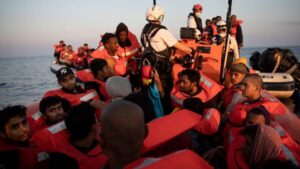
An overcrowded ship with asylum seekers leaves Libya bound for Europe – triggering a high-stakes showdown between a Doctors Without Borders vessel wanting to escort it to safety and the Libyan Coast Guard fighting to turn it back. As the Libyans issue armed threats, tension grows below deck. With European countries' responsibilities toward refugees once again in the spotlight, here is an inside view of the desperate hope that is the deadly race for Europe.
|
||||
| Vivos | 2020 | Documentary | Ai Weiwei | Link |
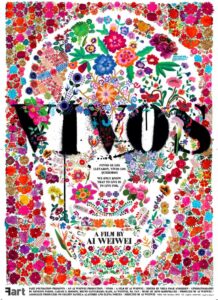
"Vivos" (2020) is a documentary feature film by artist and filmmaker Ai Weiwei, portraying the human impact of Mexico’s ongoing crisis of enforced disappearances.
On the night of September 26, 2014, a convoy of students from Ayotzinapa Rural Teachers’ College in drug cartel-afflicted Guerrero state, travelling in buses in the city of Iguala, were brutally attacked by police forces and other masked assailants. In the course of the night, six people were killed, dozens more were wounded, and 43 students were forcibly disappeared.
Featuring interviews with family members and surviving classmates, as well as human rights experts and international investigators involved with the case, "Vivos" depicts the emotional impasse the families experience. As they face the still unaccounted-for absence of their loved ones, their family lives irrevocably fractured, the pain of their loss is compounded by the investigating authorities’ repeated attempts to mislead and to obstruct the official investigation.
|
||||
| Waltz With Bashir | 2008 | Movie | Ari Folman | Link |

An Israeli film director interviews fellow veterans of the 1982 invasion of Lebanon to reconstruct his own memories of his term of service in that conflict.
|
||||
| Wandering: A Rohingya Story | 2020 | Movie | Melanie Carrier and Olivier Higgins | Link |

The documentary film Wandering, a Rohingya Story is an immersive, poetic and powerful look into the biggest refugee camp in the world, the Kutupalong refugee camp. In 2017, within a few months, 700,000 people of the Rohingya Muslim minority fled Myanmar (formerly Burma) to escape genocide and seek asylum in Bangladesh. Between poetry and nightmares, food distribution and soccer games, the Rohingyas of Kutupalong camp bear witness to their daily lives and to the ghosts of the past.
|
||||
| Watan | 2017 | Documentary | James L. Brown, Bill Irving | Link |
| Syria: Seven years. Six million displaced people. The biggest humanitarian emergency of our time. The Syrian refugee crisis remains at the forefront of the global consciousness: as statistics, as photographs, as a bargaining chip in international politics. But inside the camps real people settle in to a life in limbo. WATAN (Homeland) explores two of the biggest refugee camps in Jordan - Zaatari and Azraq - along with neighbouring city Jerash, to paint intimate portraits of the men, women and children who have found themselves there. Through observation of daily life, WATAN builds a simple yet powerful series of interwoven stories that go beyond the statistics to find the human heart of the refugee crisis. Winner of the Feature Documentary Merit Award featured at the Refugee Council of Australia's Refugee Week. | ||||
| We come as Friends | 2015 | Documentary | Hubert Sauper | Link |
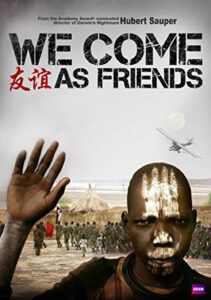
WE COME AS FRIENDS is a modern odyssey, a dizzying, science fiction-like journey into the heart of Africa. At the moment when the Sudan, the continent’s biggest country, is being divided into two nations, an old ‘civilizing’ pathology re-emerges – that of colonialism, clash of empires, and yet new episodes of bloody (and holy) wars over land and resources.
The director of DARWIN’S NIGHTMARE takes us on this voyage in his tiny, self-made flying machine out of tin and canvas, he leads us into most improbable locations and into people’s thoughts and dreams, in both stunning and heartbreaking ways. Chinese oil workers, UN peacekeepers, Sudanese warlords, and American evangelists ironically weave common ground in this documentary.
If “history does not repeat itself, but rhymes”, WE COME AS FRIENDS bares witness to this disquieting reality – it is a complex, profound and humorous cinematic endeavor – a tale of very old and rather sinister verses.
|
||||
| We Feed People | 2022 | Documentary | Ron Howard | Link |

WE FEED PEOPLE, from Oscar-winning director Ron Howard, spotlights renowned chef José Andrés and his nonprofit World Central Kitchen’s incredible mission and evolution over 12 years, from being a scrappy group of grassroots volunteers to becoming one of the most highly regarded humanitarian aid organizations in the disaster relief sector.
|
||||
| When Humanitarian Aid is Considered a Crime | 2020 | Documentary | Ora DeKornfeld and Isabel Castro | Link |
| Ora DeKornfeld and Isabel Castro’s short documentary “USA v Scott” highlights the moral questions facing an Arizona community when Scott Warren was prosecuted for bringing water to migrants in the desert. | ||||